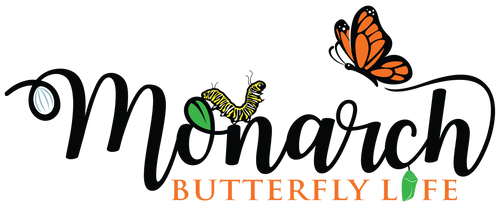Monarch Butterfly Life Cycle Facts + Raising Monarchs Tips
The monarch butterfly life cycle is a wonder to behold. In just 30 short days these magnificent insects make more changes than some humans will make in a lifetime!
Over the past 40 years, I’ve been lucky enough to witness these changes up close and personal in our butterfly garden, and also by raising monarchs indoors.
The monarch butterfly life cycle can be broken down into four main stages.

Each stage of the monarch butterfly life cycle leads to the next, even when the next stage defies logical explanation:
Below, you'll discover interesting monarch butterfly life cycle facts and some helpful raising monarch butterflies tips, if you’d like to witness all four stages of the magnificent monarch metamorphosis first hand.
Monarch Butterfly Life Stages: Egg, to Larva, to Pupa, to Adult Butterfly
Monarch Butterfly Life Cycle Part 1: EGG Stage
- Egg Stage Time: 4-7 Days until hatching- warm temps (85°F+) speed up the monarch butterfly life cycle, cool temps (below 70°F) slow it down)
- Monarch females oviposit (lay eggs) only on milkweed plants
- Butterfly Eggs can be found on the underside of milkweed leaves, stems, buds, flowers, and pods
- Cream-colored eggs are about the size of a small pin head (approx. 1mm in height and width)
Monarch Butterfly EGG Fact: Female monarch butterflies lay between 400-700 eggs during their life span.
Raise Monarch EGGS Tip:
Use sealed food containers as egg hatcheries to keep milkweed from drying out and to keep tracking of impossibly tiny monarch caterpillars.
More Raising EGGS Info: How to Hunt, Gather, and Protect Monarch Eggs
Monarch Butterfly Life Cycle Part 2: CATERPILLAR Stage:
- Caterpillar Life Span: 2 Weeks- warm temps (85°F+) speed up the monarch butterfly life cycle, cool temps (below 70°F) slow it down)
- Caterpillars (also known as larvae) can be found hiding under leaves, inside flower buds, inside the top leaves, or under the bottom leaves of the milkweed plant
Monarch Life Cycle Caterpillar Fact: Caterpillars are divided into 5 larval stage subcategories, called instars, based on their stage of development. To make a massive growth spurt of 3000% from instar 1 to instar 5, a caterpillar will molt (shed its skin) five times in a 2-week period. The fifth instar caterpillar will shed its skin to reveal the chrysalis underneath.
Raising Monarch Caterpillars TIP:
Never attempt to move a caterpillar while its molting or about to molt. You can tell a caterpillar is about to molt when you see its protruding head capsule (face cap), which is also shed during this process:

BEFORE

AFTER
More Raising Caterpillars Info:
More Info on: Raising Baby Caterpillars
More Info on: Taking Care of Large Monarch Caterpillars
Monarch Butterfly Life Cycle Part 3: CHRYSALIS Stage
- Chrysalis Stage Time: 8-14 Days (warm temps (85°F+) speed up the monarch butterfly life cycle, cool temps (below 70°F) slow it down)
- The Caterpillar hang upside down in a J-shape before shedding its skin to form the chrysalis
- Green Monarch Chrysalides blend in with nature and are hard to find outside.
- Alternative chrysalis name is pupa
-
Cocoon is NOT an alternative name for a monarch chrysalis- cocoons are the protective silk case that moth caterpillars spin before forming their pupa inside it.
Check out a Cecropia Moth Cocoon
A butterfly chrysalis is NOT encased in silk. The only silk a monarch caterpillar spins in chrysalis creation is what it will use to hang the pupa securely:

Stuck to a Tree…with SILK
Monarch Life Cycle Chrysalis Fact: Monarch caterpillars rarely pupate (form their chrysalis) on milkweed plants outside.
Discover 50 places to look for a monarch chrysalis outdoors
Raising Monarch Chrysalis Tip:
If a chrysalis falls from its hanging place in your habitat, there are several options for helping to insure a monarch will still survive to reach butterhood.
More Raising Chrysalis Info:
Monarch Chrysalis Problems + Surprising Solutions
Monarch Butterfly Life Cycle Part 4: Adult BUTTERFLY Stage
- The scientific name for the monarch is Danaus plexippus
- Life span Spring and Summer Butterflies : 2-6 Weeks (warm temps (85°F+) speed up the monarch butterfly life cycle, cool temps (below 70°F) slow it down)
- Life span Fall Migration Butterflies: 8 months+
- Adult Monarchs respond to environmental cues that tell them when to migrate including: temperature, sun angle, declining daylight hours, and wind direction
- As a migratory species, you will entice more monarchs to your garden with a thoughtful mix of native plants and long-blooming annuals
See some our Top Butterfly Plant Recommendations
Monarch Life Cycle Butterfly FACT: The adult stage provides the best opportunity to learn the sex of the monarch. Look for these telltale signs to discover:
Monarch Male Butterfly or Female? How to Tell the Difference<<<< (Who has thinner black veins and a black spot on each hind wing?)
Raising Monarch BUTTERFLIES Tip:
After a butterfly emerges from its chrysalis, it needs to dry and strengthen its droopy wings for (at least) four hours. If you're unsure about whether to release a butterfly, keep it overnight (in a mesh cage) so its wings will be fully ready the next day. This gives it a better chance to elude predators, and even territorial monarch males.
Soon after release, your adult monarch butterfly will be ready for mating, or sip nectar before flying to Mexico or California on a great fall migration during the months of August, September, and October.
More Raising Butterflies INFO:
How To SAFELY Release Monarch Butterflies
Now that you have a general introduction to the Monarch Butterfly Life Cycle, are you interested in raising a few at home to witness this amazing metamorphosis up close? Check out this post to learn what you need to begin your raising journey:
How To START Raising Monarch Butterflies?

